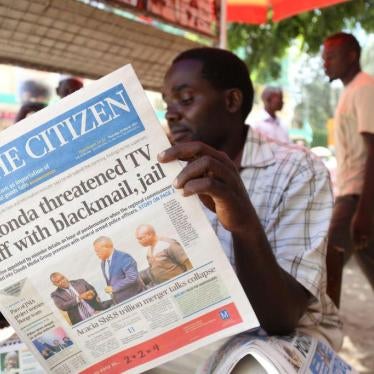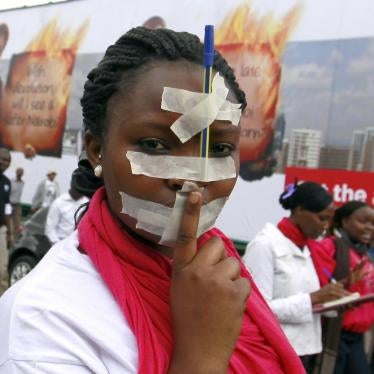The Kenyan government should urgently and publicly order the police to stop using excessive, lethal force against public rallies, Human Rights Watch said today. Human Rights Watch urged political leaders on all sides to call on supporters to demonstrate peacefully.
Opposition leaders have called for rallies next week in defiance of the government's broad ban on public gatherings, prompting concerns that new clashes could result in further deaths and injuries. Human Rights Watch is also concerned by ongoing violence in the Rift Valley, where hundreds of people have died and hundreds of thousands have been displaced.
"Kenyan security forces have a duty to rein in criminal violence and should protect people, but they shouldn't turn their weapons on peaceful protestors," said Georgette Gagnon, acting Africa director at Human Rights Watch. "The government should make it very clear that police will be held to account for using lethal force against people for simply expressing political views."
Since the disputed December 27, 2007 presidential elections, Kenyan police in several cities have used live ammunition to disperse protesters and disperse looters, killing and wounding dozens. Some observers and even police have described the police response as an unofficial "shoot to kill" policy. For example, Human Rights Watch received credible reports that in Kisumu dozens of people were shot dead by police while demonstrating against the election result announced on December 31.
Even people who did not attend rallies have been affected. Human Rights Watch spoke to eyewitnesses in Nairobi who saw unarmed individuals hit by police gunfire on the fringes of protests in the Kibera and Mathare slums. One woman was hit by stray bullets that penetrated the wall of her home. Another unarmed man was shot in the leg. A boy watching a protest from the door of his house was shot in the chest. Kenyan human rights organizations reported deaths and injuries involving police in the cities of Nairobi, Mombasa, Kisumu, and Eldoret.
A source within the police, who was unwilling to be identified, told Human Rights Watch that "many of us are unhappy with what we are being asked to do. This ‘shoot to kill' policy is illegal, and it is not right. We have brothers and sisters, sons and daughters out there."
In policing demonstrations, the Kenyan police should abide by the United Nations Basic Principles on the Use of Force and Firearms by Law Enforcement Officials, Human Rights Watch said. The principles call upon law enforcement officials to apply nonviolent means before resorting to the use of force only in proportion to the seriousness of the offense, and to use lethal force only when strictly unavoidable to protect life.
Kenyan and international law prohibits a general ban on demonstrations. Under Kenyan law, those wishing to demonstrate must notify the police and the police can reject the request on the grounds of public order, but no law permits the authorities to impose a blanket ban on public assembly. Under the International Covenant on Civil and Political Rights, which Kenya ratified in 1976, a state may only impose restrictions on the right to peaceful assembly that are strictly necessary to maintain public order.
"The government should defuse tension by immediately lifting the ban on public assembly and allowing the planned demonstrations to go ahead," said Gagnon. "The right to peaceful assembly is a cornerstone of a healthy democracy."
The government has also banned live political broadcasting. Human Rights Watch again urged the Kenyan authorities to immediately lift unnecessary restrictions on media freedom.
Human Rights Watch also called on the government to immediately investigate the deaths that have already occurred during protests and in the Rift Valley. Prosecutions should be carried out where there is evidence of wrongdoing and the victims should be provided an adequate remedy, including compensation.
Background
Kenyans voted peacefully and in record numbers in parliamentary and presidential elections on December 27. In the parliamentary elections, 99 of the 210 seats were won by the opposition Orange Democratic Movement (ODM). Vice-President Moody Awori and 14 of President Mwai Kibaki's top ministers lost their seats.
The presidential election pitted Kibaki against the ODM's Raila Odinga, and the presidential vote count appeared to be tampered with. The chairman of the Electoral Commission of Kenya said that he did "not know whether Mr. Kibaki won the elections." The European Union Electoral Mission also expressed grave doubts about the legitimacy of the presidential results.
Talks between the opposition and the Kibaki government have not yet occurred and the opposition is planning for further mass action across the country on January 16, 2008. Further violence is expected as the government has indicated it will attempt to prevent the demonstrations from occurring.
Violence has spread throughout the Rift Valley and the west of the country as angry citizens have burnt and looted factories, shops and homes and chased away those perceived to be supporters of Kibaki (mostly, but not exclusively, members of his Kikuyu tribe). Kikuyu homes in the Rift Valley have been selectively burned and Kikuyu residents killed. Thirty people were burned to death in a church near Eldoret. According to media reports, the mortuary in Eldoret contains 290 bodies killed as a result of the violence, and Kisumu has 91. Nationwide, government figures put the death toll at 486 but independent estimates range as high as 600.






